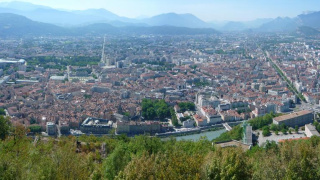The city of Grenoble has been in the news for all the wrong reasons, sadly foremost for its terrible safety record.
“Grenoble has unfortunately become the number one city in France for violent assault and pickpocketing,” says Carignon. It has become an unbearable situation for the inhabitants.
The current Green mayor wanted to make Grenoble “a soothing city” but it has become, according to police unions, a “French Chicago “. How did that happen?
According to Carignon, the very first announcement by the Mayor after he took office that he would not allow video-protection cameras, was good news for delinquents.
“In parallel, Eric Piolle has led an irresponsible policy of allocating housing in the HLMs which he administrates, which accelerated the ghettoisation of the districts and densified the city massively – Grenoble has exceeded Villeurbanne – and is an additional factor contributing to explosion of the city,” Carignon explained.
The acronym of Habitation à Loyer Modéré or rent-controlled housing, is a form of private or public housing in France, Algeria, Senegal, and Quebec. HLMs constitute 16 percent of all housing in France.
In 2012, 18 percent of Villeurbanne’s population were immigrants, that is to say 26 328 immigrants for 146 282 inhabitants. The countries of origin of immigrants in order of importance are Algeria, with a head start (6 275 inhabitants), ahead of Tunisia (2 560), Morocco (2 226) and other African countries (3887). It is situated northeast of Lyon, with which it forms the heart of the second-largest metropolitan area in France after that of Paris.
A dangerous pauperization has been ongoing thanks to the mayor, since Grenoble’s inhabitants have witnessed a massive decline in their property values. The city is experiencing the flight of the middle class because they are attacked by municipal politics, Carignon said.
The figures of delinquency in Grenoble are disturbing and mirror those advanced by police unions that compare the city to a “French Chicago”.
These numbers are rarely made public because they are difficult to find. Since 2014, the Ministry of the Interior has refused to communicate the quantified assessments of delinquency in Grenoble. And when examining these statistics, it is easy to understand why.
Piolle had challenged former Interior Minister Gérard Collomb, saying that “we are clearly in a critical situation” in Grenoble.
In the first eight months of 2018, personal injury had increased by 18,49 percent in the Grenoble area, with 3 172 recorded incidents. These figures may be underestimated according to some police officers, because assaults have become so common that they are not necessarily all subject to a complaint.
At the same time, non-villainous violence also jumped 21,86 percent. Non-villainous violence is defined by the police service as acts which are not aimed at the acquisition of personal belongings contrary to the villainous violence which thus include robberies with violence, armed robbery or extortion.
But the most disturbing figure is undoubtedly this one: Compared to 8 other cities of similar size, the AVIP in police jargon (voluntary attacks on physical integrity) are, in Grenoble, 53 percent higher.
Clearly, there are many more physical attacks in Grenoble than Rennes or Toulon, for example. This huge gap between Grenoble and other cities is also very important when it comes to non-villainous violence. In Grenoble, there are 31,24 percent more attacks than the average of 8 cities of similar size.
Grenoble is therefore much more violent and less secure than its counterparts. This numerical truth was confirmed by information regularly provided by the police unions.
The police in Grenoble have meanwhile warned about a severe staff shortage. At police stations there are 35 vacancies, because the city can no longer recruit for lack of attractiveness.
After the summer in 2018, marked by renewed violence in the agglomeration, the Grenoble police sounded the alarm.
This problem of staffing is, according to them, linked to a higher crime rate than elsewhere but also to high rent prices in the capital of the Alps. In short, Grenoble is not an attractive city for police officers who earn 1 400 euros early in their careers and 2 200 euros at the end.
“We are forced to move away from the city to have cheaper rents” says Antoine. The agglomeration is not classified as a sensitive area and therefore offers no loyalty bonus – an annual bonus of 800 euros per year that the police receive in other cities like Lyon or Paris.
However, Grenoble has a crime rate which is 63 percent higher than elsewhere.




